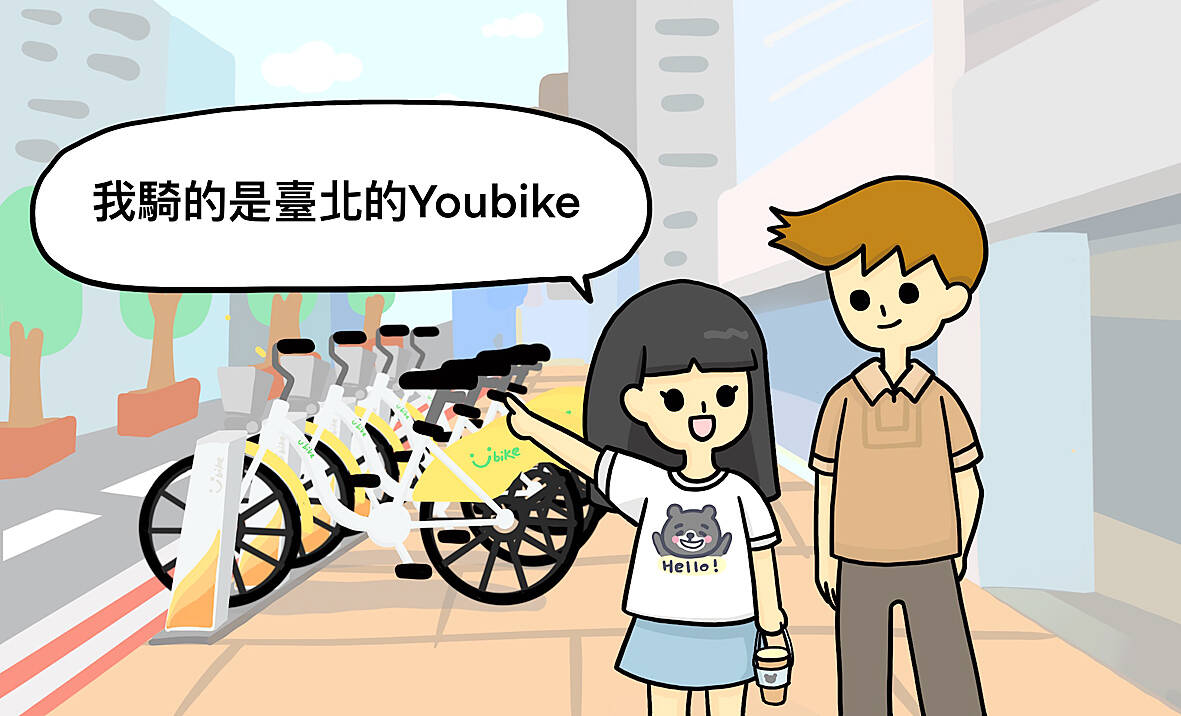對話 Dialogue
馬克:小實,我剛才在路上好像看到你騎腳踏車。
Make: Xiǎoshí, wǒ gāngcái zài lùshàng hǎoxiàng kàn dào nǐ qí jiǎotàchē.

小實:對啊,那是我沒錯,我是騎車來學校的。
Xiaoshi: Duì a, nàshì wǒ méicuò, wǒ shì qíchē lái xuéxiào de.
馬克:是嗎?那你的腳踏車在哪裡啊?
Make: Shì ma? Nà nǐ de jiǎotàchē zài nǎlǐ a?
小實:那不是我的車,我騎的是臺北的YouBike。
Xiaoshi: Nà búshì wǒ de chē, wǒ qí de shì Táiběi de YouBike.
馬克:YouBike是什麼?大家都可以騎嗎?
Make: YouBike shì shénme? Dàjiā dōu kěyǐ qí ma?
小實:對啊,YouBike是一種共享的腳踏車,用「悠遊卡」就可以租一輛YouBike喔!很方便。
Xiaoshi: Duì a, YouBike shì yìzhǒng gòngxiǎng de jiǎotàchē, yòng yōuyóukǎ jiù kěyǐ zū yí liàng YouBike o! Hěn fāngbiàn.
馬克:聽起來很棒,我下次也要試試看。
Make: Tīng qǐlái hěn bàng, wǒ xiàcì yě yào shìshìkàn.
翻譯 Translation
Mark: Xiaoshi, I just saw you riding a bicycle on the road.
Xiaoshi: Yeah, that was me. I came to school by bike.
Mark: Really? Where is your bicycle then?
Xiaoshi: Oh, that’s not my bike. I’m riding a YouBike in Taipei.
Mark: What is a YouBike? Can everyone ride?
Xiaoshi: Yes, YouBike is a shared bicycle. You can rent a YouBike with an “EasyCard!” It is very convenient.
Mark: Sounds great, I’ll give it a try next time.
單字片語 Vocabulary
1. 騎 (qí) to ride
2. 腳踏車 (jiǎotàchē) bicycle
3. 共享 (gòngxiǎng) share
4. 悠遊卡 (yōuyóukǎ) EasyCard
5. 租 (zū) rent
6. 聽起來 (tīng qǐlái) sounds
7. 試試看 (shìshìkàn) try it
教材音檔 Audio Files
教材影片 Video Files:
https://www.instagram.com/celc.nou_tw/guide/_/17999106352646292/
實踐大學華語中心提供
By Shih Chien University Chinese Language Center: https://chineseusc.com/

In an effort to fight phone scams, British mobile phone company O2 has introduced Daisy, an AI designed to engage phone con artists in time-wasting conversations. Daisy is portrayed as a kindly British granny, exploiting scammers’ tendency to target the elderly. Her voice, based on a real grandmother’s for authenticity, adds to her credibility in the role. “O2” has distributed several dedicated phone numbers online to direct scammers to Daisy instead of actual customers. When Daisy receives a call, she translates the scammers’ spoken words into text and then responds to them accordingly through a text-to-speech system. Remarkably, Daisy

Bilingual Story is a fictionalized account. 雙語故事部分內容純屬虛構。 Emma had reviewed 41 resumes that morning. While the ATS screened out 288 unqualified, she screened for AI slop. She could spot it a mile away. She muttered AI buzzwords like curses under her breath. “Team player.” “Results-driven.” “Stakeholder alignment.” “Leveraging core competencies.” Each resume reeked of AI modeling: a cemetery of cliches, tombstones of personality. AI wasn’t just changing hiring. It was draining the humanity from it. Then she found it: a plain PDF cover letter. No template. No design flourishes. The first line read: “I once tried to automate my

Every May 1, Hawaii comes alive with Lei Day, a festival celebrating the rich culture and spirit of the islands. Initiated in 1927 by the poet Don Blanding, Lei Day began as a tribute to the Hawaiian custom of making and wearing leis. The idea was quickly adopted and officially recognized as a holiday in 1929, and leis have since become a symbol of local pride and cultural preservation. In Hawaiian culture, leis are more than decorative garlands made from flowers, shells or feathers. For Hawaiians, giving a lei is as natural as saying “aloha.” It shows love and

1. 他走出門,左右看一下,就過了馬路。 ˇ He walked outside, looked left and right, and crossed the road. χ He walked outside and looked left and right, crossed the road. 註︰並列連接詞 and 在這句中連接三個述語。一般的結構是 x, y, and z。x and y and z 是加強語氣的結構,x and y, z 則不可以。 2. 他們知道自己的弱點以及如何趕上其他競爭者。 ˇ They saw where their weak points lay and how they could catch up with the other competitors. χ They saw where their weak points lay and how to catch up with the other competitors. 註:and 一般連接同等成分,結構相等的單詞、片語或子句。誤句中 and 的前面是子句,後面是不定詞片語,不能用 and 連接,必須把不定詞片語改為子句,and 前後的結構才相等。 3. 她坐上計程車,直接到機場。 ˇ She took a cab, which took her straight to the airport. ˇ She took a cab and it took her straight